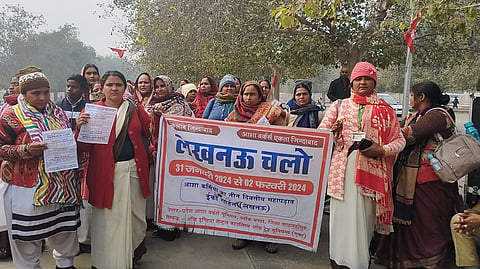
Lucknow: On the day Union Finance Minister Nirmala Sitharaman announced that a health cover under the Ayushman Bharat scheme will be extended to the ASHA ( Accredited Social Health Activist) workers, the health activists working across Uttar Pradesh assembled at Kanshi Ram Eco Garden in the state capital to demand fair wages and favorable working conditions.
They complained that they are getting a meagre wage of Rs 2,200, which is even insufficient to meet their daily expenses. They said they are highly over worked. They even alleged their senior colleagues often thrash them for slightest of mistake.
Usha Rani from Moradabad said, “During the Covid crisis, when people were staying at home to save their lives, they (the ASHA workers) were serving the patients – risking their lives. We are paid Rs 50 for conveyance and Rs 2,000 as renumeration for our work. How can we make ends meet with such a small amount in this time high inflation.”
Vinita from Badaun alleged ASHA workers are so overworked that they don’t get even an hour to rest. “We do not even get the time to have lunch. It is us who ensured a polio-free India,” she said.
Rakhi from Pilibhit, which has huge wildlife sanctuary, the ASHA workers in the area always face the risk of attack by tigers or other wild animals when they go to villages. “If our demands are not met, we will go on strike from February 16,” she threatened.
Anil Verma , general secretary of the All India Central Council of Trade Union (AICCTU), said, “Our organization has always raised the issue of ASHA workers and demanded that they be given the status of state employees. The government had even agreed that the workers should be elevated to the status of state employees but nothing happened so far. The ASHA workers had organized a massive dharna (sit-in) on September 25 last year. The government had then promised to hold a tri-lateral dialogue, but it also turned out to be mere lip service. If the government does not concede to our demands now, we will a nationwide movement on February 16.”
ASHA workers are usually local women who are provided a basic training to acquire essential healthcare skills. The training covers various aspects of maternal and child health, family planning, immunization and communicable diseases.
They are responsible for promoting institutional deliveries, antenatal and postnatal care and immunization. They provide information about family planning methods and distribute contraceptives.
The health workers play a crucial role in ensuring that children and pregnant women receive timely vaccinations. They also educate the community about sanitation, nutrition and preventive healthcare practices.
The ASHA program was launched by the Government of India as part of the National Rural Health Mission (NRHM) in 2005. It aims to strengthen primary healthcare in rural areas and improve maternal and child health outcomes. The program has been recognized for its positive impact on healthcare delivery in underserved communities, although challenges such as varying quality of training and workload issues have been noted.
Their demands include a minimum pay of Rs 26,000 ever month, their recognition as state health workers in concurrence with the 45th Indian Labour Convention, immediate circular against the violence on ASHA workers, EPF and ESI schemes for them, immediate payment of the due amount for the role played by them in services like leprosy eradication and polio eradication and during Covid pandemic and formation of a committee for calculation of the due payment.
Also Read-
You can also join our WhatsApp group to get premium and selected news of The Mooknayak on WhatsApp. Click here to join the WhatsApp group.